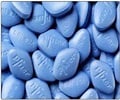Exposure to high levels of Bisphenol-A (BPA), a chemical compound found in baby bottles and plastic containers, increases the risk of male sexual dysfunction, according to a new study.
Exposure to high levels of Bisphenol-A (BPA), a chemical compound found in baby bottles and plastic containers, increases the risk of male sexual dysfunction, according to a new study.
Previous animal studies had shown that BPA had a negative impact on mice and rats, but the study published Wednesday in the journal Human Reproduction was the first to examine its effects on male reproductive systems in humans.The study examined 634 workers in factories in China over a five year period, comparing workers in facilities that produced BPA with those in facilities where the chemical compound was not present.
"The study found that the workers in the BPA facilities had quadruple the risk of erectile dysfunction, and seven times more risk of ejaculation difficulty," the study said.
The levels of BPA in the Chinese facilities were 50 times higher than what an American male faces in US factories, and it was not known what the effect of lower levels of exposure might be.
"This study raises the question: Is there a safe level for BPA exposure, and what is that level?" said De-Kun Li, an epidemiologist with Kaiser Permanente in Oakland, California and a lead author of the study.
"More studies like this, which examine the effect of BPA on humans, are critically needed to help establish prevention strategies and regulatory policies," he said.
BPA is used in the production of polycarbonated plastics and epoxy resins found in baby bottles, plastic containers, the lining of cans used for food and beverages, and in dental sealants.
A 2008 study by toxicologists at the National Institutes for Health found that the substance could affect the development of the brains of fetuses and newborns.
In March, the six biggest US manufacturers of baby bottles decided to stop selling products containing BPA in the United States, and US lawmakers introduced legislation to ban food containers with BPA.
French Health Minister Roselyne Bachelot, nevertheless, said in March that reliable studies had concluded that baby bottles made with BPA were harmless.
Source-AFP
SRM












